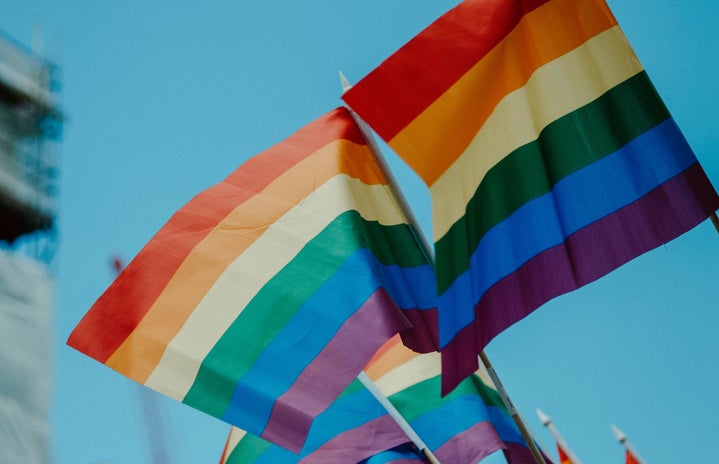Despite the term `LGBTQ+` being deemed a modern term, the concept of homosexuality and other more divergent forms of gender and sexual expression have been prevalent for a long time throughout history.
Historical accounts of homosexuality have dated to as far back as the 14th century with Edward II’s strong tendency of relying upon his favourite `friend` Piers Gaveston leading to many believing the two were in fact lovers. Furthermore, the Galli of the Roman era were known to break gender norms through the gender identification of what we now refer to as `non-binary`.
Albeit homosexuality existing historically, it was not until the later half of the 20th century that attitudes towards it began to slowly change. As the LGBTQ+ community has grown to be accepted more widely into the mainstream in the present day, it is incredibly important that we as members or allies, familiarise ourselves with the rich history and culture in order to know the roots of LGBTQ+ and how we can make the world a safer and prouder place.
So here are some of the most influential events of LGBTQ+ history to mark the beginning of LGBTQ+ History month in the United Kingdom.
In 1533, the Buggery Act was passed, marking homosexuality as not only illegal, but punishable by death. It was not until the mid 1800s, when the death penalty was rendered illegal that the sentence was reduced to at least a decade in Britain. Due to the stigma and the laws against the community, many members hid their sexualities and acted more discretely through for instance, creating underground bars where homosexual acts were allowed to take place behind closed doors. Unfortunately, many individuals were caught, including famous writer Oscar Wilde who was trailed and persecuted in 1895 with the judge calling this `the worst crime imaginable`.
Fast forward to the 1930s in Spain where a group of transgender women and drag artists performed the first documented LGBTQ+ protest in Barcelona after the government had destroyed a significant LGBTQ+ meet spot due to the nature of the interactions. This took place amidst the rise of the queer club scene within many European countries as homosexuality, despite still being an illegal act, continued to expand behind closed doors.
It was not until 1967 when homosexuality between two men over the age of 21 in a private space was legalised. This however still enforced the unpleasant experiences as for the most part, homosexuality was still socially frowned upon and homophobic hate crime soared further during this period as men were now allowed to `come out`.
However this still didn’t change much for the LGBTQ+ community as for the most part, the police still considered it a criminal act and turned a blind eye to homophobic crimes such as assault and murder. However, there would be a turning point in 1969 after the police raided the popular gay bar, The Stonewall Inn in New York.
When many think of the moment of change within the LGBTQ+ community and their rights, they think of the Stonewall Riots as this had a huge influential impact throughout the Western world. This was a moment when the gay community, the transgender community, activist groups (such as the Gay Liberation Front) and allies alike all came together to reclaim their freedom and their right to express themselves, marking this as one of the most momentous events of LGBTQ+ history.
A year after in the UK, the London Gay Liberation Front was founded (inspired by its American counterpart) in order to protest and petition for LGBTQ+ rights and just two years later, founding the first-ever British Pride event on the anniversary of Stonewall. This would be a grand celebration of all sexualities and gender identities that has continued to flourish each year in the UK and now takes place in almost every big city annually.
However, the premiership of Margaret Thatcher in the 1980s proved to be a dark age for the progression of LGBTQ+ rights in Britain as `Section 28` was passed in 1988. Section 28 was a bill that `prohibited the promotion of homosexuality` within schools or other educational practices. This meant that children were not taught about the spectrum of sexualities and those who were members of this community could not receive help or support when they struggled to come to terms with their identities.
This made it that queer people were soon outcasted from society and had no place to be supported. This remained the situation until 2003 when this bill was banned after protests and movements were performed against it.
After the reign of Thatcher ended, LGBTQ+ rights began to become a more important issue to the government as it was evident that queer people still did not receive treatment that reflected the basic human rights that they deserved. In 1992, homosexuality was no longer labelled a mental illness. In the grand scheme of things, though very significant, this is a fairly recent event which is insane to think about considering how far we have come since the 1500s.
It may be shocking to reveal that it was not until 2014 (a year I’m sure to which most of us will remember as it was less than a decade go) that same-sex marriage was legalised in England and Wales with Scotland following suit in 2015. Considering how recent this is, it shows the extent to which LGBTQ+ rights have been diminished by the government all this while as it has taken this long for queer people to gain very basic human rights that we, as people, should rightfully gain. These rights that many heterosexual people sometimes take for granted are in reality, the same ones that many have spent a lifetime yearning for.
Through looking back on the queer history of Britain, I hope that we can all gain a better understanding of the LGBTQ+ community and express our appreciation for the fight of generations of LGBTQ+ people before us as although there is still a long way to go within Britain, there still are many places around the world where the punishment for being queer is still the death penalty.
In light of LGBTQ+ History month, we should all take to acknowledge those that paved the way for LGBTQ+ rights and do our part to become a better ally. We have come such a long way in the past 50 years but it is important to remember that there is still such a long way to go in this journey and we must continue to grow and learn along the way.
Words by: Eilidh Kirk
Edited by: Harsheni Maniarasan


